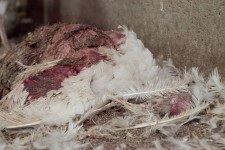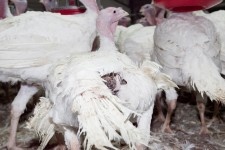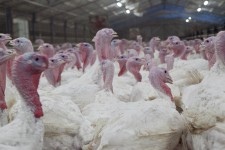- Overview
- Confinement
- Turkey poults
- Mutilation
- Artificial lighting
- Health Concerns
- Use of antibiotics
- Genetic alterations
- Muscle disorders
- Skeletal disorders
- Lame and injured birds
- Mortality rate
- Artificial insemination
- Health problems of breeders
- Slaughterhouse
- Turkeys: sentient and intelligent
- Conclusion
- References
Health Concerns
Turkeys experience a range of health problems whilst being raised in intensively farmed conditions. The stress of these conditions weakens their immune systems(20) and the fact that 80 per cent of the floor litter is faeces creates a number of problems.(21) The sheds in which the turkeys are raised are not cleaned out from when the turkeys first enter as poults to when they are removed for slaughter (a period of three months). Faecal matter accumulates and inadequate litter management, improper ventilation and drinker management results in a build-up of ammonia.(22) (See Figure 6). This build-up causes turkeys to develop extremely painful burns on their feet, legs and breasts.(23)
Turkeys suffer from these problems more than broiler chickens (chickens bred for meat) because turkeys are kept alive for longer and therefore are in contact with dirty litter for longer.(24) The air quality can cause respiratory and eye diseases and contribute to reduced food intake causing weight loss and lameness.(25) Constant sitting on the damp litter accelerates the incidence of leg weakness, and the lack of sunlight and fresh air facilitates the spread of bacteria and infections.(26)
The turkeys are susceptible to heart disease and experience great difficulty in supporting their overweight bodies.(27) They suffer from painful swollen joints, obesity, crippled legs and degeneration of the hip joints and have crippled feet.(28) The wide range of health problems turkeys experience when reared in this environment raises serious welfare concerns. (See Figures 7 and 8).
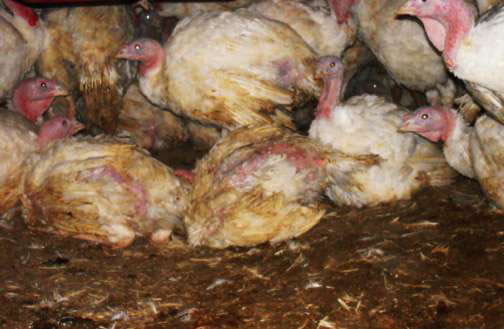 Figure 7: Factory-farmed turkeys in Australia living in accumulated waste resulting in a build-up of ammonia. The foreground of the picture shows sick and injured birds experiencing difficulties standing.
Figure 7: Factory-farmed turkeys in Australia living in accumulated waste resulting in a build-up of ammonia. The foreground of the picture shows sick and injured birds experiencing difficulties standing.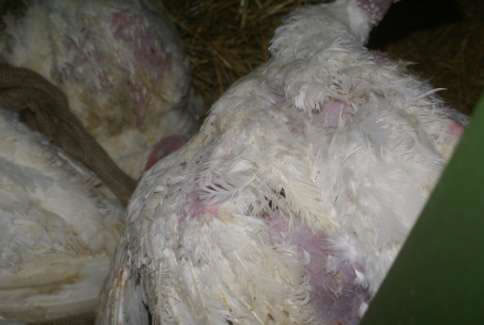 Figure 8: Factory-farmed turkeys in Australia suffering from feather loss and burns on their breasts.
Figure 8: Factory-farmed turkeys in Australia suffering from feather loss and burns on their breasts.

